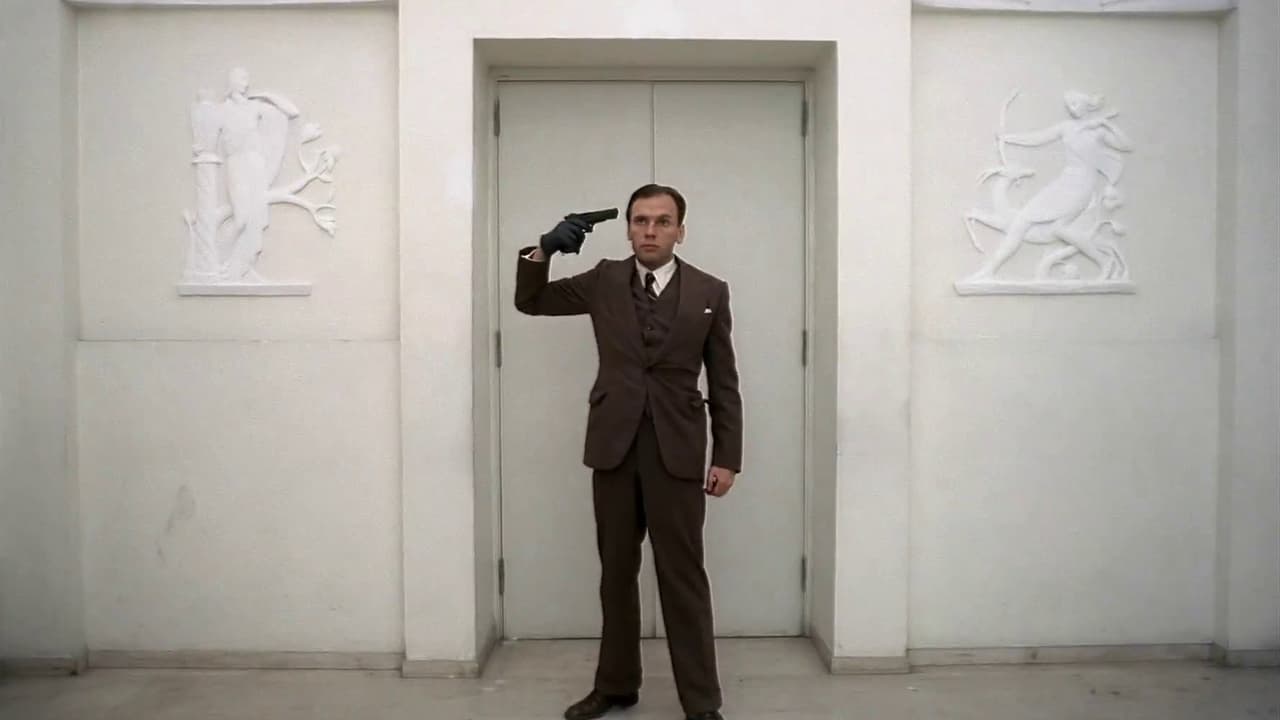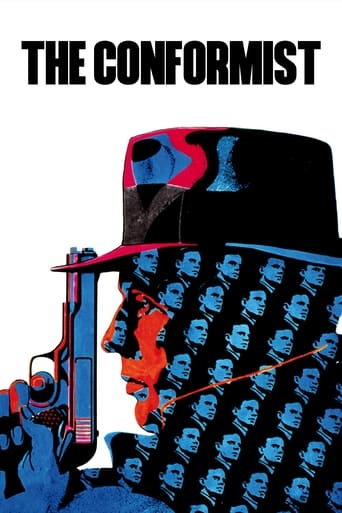BoardChiri
Bad Acting and worse Bad Screenplay
CrawlerChunky
In truth, there is barely enough story here to make a film.
Tyreece Hulme
One of the best movies of the year! Incredible from the beginning to the end.
Cheryl
A clunky actioner with a handful of cool moments.
quinimdb
"The Conformist" is about a man desperately trying to conform and be "normal" in fascist Italy under Mussolini, although he is anything but fascist. When he plans to marry a "normal" fascist, ditsy Italian girl and takes a job to arrange an assassination of a previous teacher of his that is now a political dissident, his struggle becomes real. The professor's wife is a representation of him on the other side. He wants to conform, to fit in and be a fascist like everyone else, but can't force himself to do so, so he takes a fascist job in the secret police to suppress anti-fascism. But he begins to have second thoughts, and wants to get out, but can't find a way. The professor's wife on the other hand, is an anti-fascist, but she still feels fear that she may be killed by fascists, and the relationship between her and Marcello's wife, Giulia, is a metaphor for his internal struggle, as well as tensions and thoughts from both fascists and anti- fascists in Italy during the period of Mussolini. The scene at the dance is the penultimate moment of his decision in this, even at one part showing Giulia and the professor's wife, Anna, dancing around him as he frantically looks back and forth at them, as his fascist helper and the non fascist professor sit at opposite sides of the room. Then it seems he will pick the non fascist route when he dances with Anna, but as the next scene shows, it seems he had no choice in the first place. The dreamlike blue hue of the world turns into bleak whites and browns of the snow, as he watches Anna and the professor be murdered in front of him, by his own doing. And speaking of the cinematography, oh my God! This movie is absolutely beautiful and has some of the best use of lighting, color, and space that I have ever seen. Anyway, then it cuts to Marcello's years later, when Mussolini has just been taken down from the throne (by someone more powerful than him), with Giulia and kids, praying with them, showing he has fully conformed to "normal" life like he wanted to. But as he is reminded of the murders of the professor and his wife, he promptly states that that operation was "good for his job", with barely any emotion. He walks outside to see a man that he remembers from his childhood, shown earlier in the movie while he is confessing to a priest. In that scene, he is lead into a room by a young man that "saved" him from bullies, with the promise that he will show him a gun. He does show him a gun, and also begins to molest the child, but suddenly, Marcello stands up and shots wildly around the room before shooting the man, believing he is dead. Back to the present, he sees this man on the steps and immediately begins to call him a fascist and point the finger at him. This is representative of the way that Marcello suddenly begins to deflect the blame of his murders to Mussolini, now that it is normal for everyone to hate Mussolini, and to not hate him would mean to not fit in. However, I believe the final shot reveals that he is not the same person that he was back then, showing Marcello looking from behind bars looking through them at the boy that the man on the stairs was going to molest. This is also symbolic for the fact that he acknowledges he is not the victim anymore, but has become the perpetrator just to fit in, and now he needs to go back to the way he was before, but has already settled into his new, normal life that he has made for himself, showing that he will forever have to live with the guilt of what he has done.More rambling, but it's hard to form a coherent review of this film and get all of my thoughts on it out there after just one viewing. And that's another thing, this film most definitely warrants subsequent viewings.
Lucas Versantvoort
Director Bernardo Bertolucci was on to something when he directed and wrote Il Conformista/The Conformist in 1970. It's a political thriller of sorts, dealing with the fascist politics of Italy around 1938. More than that, however, it's a psychological examination of one man's mind, Marcello's. The film traces the important events of his life, how sexuality and violence traumatized him, and how it all led to him being desperate to conform to whatever seems popular at any given time. The desire to be normal is something we're all familiar with, but Il Conformista pushes this phenomenon to its most psychologically extreme form.The story begins in 1938 in Paris when Marcello (Jean-Louis Trintignant), sitting on his hotel bed, is called by his employer, a member of the Fascist secret police, telling him the plan's about to go enter the final stage: the murder of a college professor who's fled Italy when the fascists took over. To make matters more interesting, the professor is an old acquaintance of Marcello's. He gets in the car with a colleague and together they chase down the professor. The film then flashes back to other crucial parts of Marcello's life to show how he became the man he is today. Every once in a while, the film goes back to the present, with Marcello sitting in the backseat while his colleague chases after the professor. Though to say too much would be spoilerish, flashbacks include an early one when where Marcello is bullied as a child and saved by chauffeur Lino. He takes him to a mansion where he shows him a gun and then tries to seduce him. Marcello seems to give in to his advances, but then takes the gun and kills Lino in a hail of bullets. Other flashbacks show his attempts to join the fascist secret police and his attempts to be normal. The only reason he wants to marry Giulia is because he thinks she's as plain as can be, a typical normal wife that all of society can accept. The entire film thus leads up to the point where Marcello and his colleague give chase to the professor.I've always considered Il Conformista to be more of an incredibly subtle horror film than a drama or a thriller. Obviously, the film isn't a typical horror film, but it is horrifying in terms of its psychological portrayal of Marcello. This is particularly apparent in the film's climax in regard to the professor which even now is hard to stomach. The number of ways in which that scene is horrifying is something no typical horror film comes close to achieving, because it's not about physical violence so much as it is about the emotional violence inflicted on a fellow human being. It's hard to explain. You have to see it to believe it. There's something quite threatening ingrained in every single scene which is ironic, because the film looks absolutely stunning. Here's where Bertolucci and legendary cinematographer Vittorio Storaro's achievements come into sharp focus. First of all, they emphasize the Fascist art style during the scenes where Marcello's in the vicinity of Fascist government buildings. The architecture is easily recognizable with its emphasis on the color white and sharp angles. It's very suggestive of old German propaganda films. On the other hand, the film's color scheme is very lush which contrasts with the physical and emotional violence taking place.The way the story is set up is absolutely wonderful and there are little things that tie several events together quite nicely. Consider for instance the notion of the driver, or the chauffeur. Every time we see Marcello inside a vehicle, he's never driving himself, he's always being driven by someone else. In the same sense, he's also driven by others to do their dirty work for them. During the entire chase scene, Marcello occupies the backseat; when he's a little boy, he's chauffeured by Lino to a mansion; he and his fiancée Giulia occupy a train cabin, etc. It's a neat and subtle way of symbolizing how Marcello is not in control of his own life and tends to follow those that lead. Half the story is basically told through the cinematography. Also important is the way in which Bertolucci links the themes of sex with fascism and violence and the desire to be 'normal' and how this is all intertwined in Marcello's mind. Marcello doesn't care about joining the fascists beyond that it will help him appear normal in the eyes of others. The themes of sex, violence and fascism are those that director Bob Fosse would utilize in Cabaret two years later. While both are successful in doing this in their own ways, there's a risk in that by equating the politics of their times with sex, you simultaneously ignore the other historical factors at play. Obviously, Bertolucci and Fosse are aware of this and that one film can't encompass the entire rise of Fascism, but it's important to note nonetheless. And it's peculiar indeed that these two films which so closely followed one another look at the subject of fascism through similar lenses. Either way, Il Conformista is classic cinema in the finest sense. The editing keeps the audience on its feet with the constant crosscutting between past and present, constantly promising death is on its way, the cinematography is lush and suggestive, Delerue's score is melancholy and tense, Trintignant is incredibly understated and Bertolucci's direction is wonderful. A political and psychological thriller for the ages.
SnoopyStyle
Marcello Clerici is in Paris to assassinate his former college professor Luca Quadri on the fascist Italian government's orders. Manganiello is driving him tracking Luca and his wife Anna. The movie has various flashbacks of his life. He is disliked as a child by the other kids. Chauffeur Lino befriends the kid but then makes a sexual advance on him. He take Lino's gun and shoots wildly presumably killing Lino. In another series of flashbacks, he is getting married to Giulia and keeps a lot of his life secret from her. They go to Paris on their honeymoon and befriend the Quadris. After the war, Marcello meets up with Lino once again.The conformist is a nice way to describe the lead character. He is a man with no convictions. He is damaged and weak. It's hard man to care about but still fascinating. The start of the movie does lack clarity. I would like the flashbacks to not switch back and forth so much in the beginning. Director Bernardo Bertolucci has a great eye and this is filmed beautifully. The ending is so powerful. Marcello had been holding back until he finally explodes. In that one instant, the audience glimpses his true self.
jackasstrange
Flawless masterpiece. A very engaging, weird and entertaining film. The atmosphere, the cinematography(the use of lights and shadows is jaw dropping), everything is freaking great. The cinematography is really fascinating, we can see the baroque inspiration in some shots. Those who love cinema will love this film. Anyway, is a quite unique film,there are few twists(I thought he would risk his life to help the women in the ambush, since he apparently liked her). I've never seen a film where we actually follow(and even root for) a protagonist that is a fascist. And is very interesting from a psychological viewpoint.Anyway, masterpiece.

